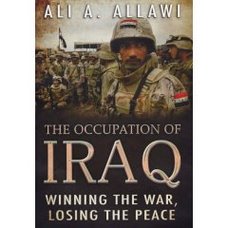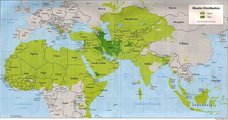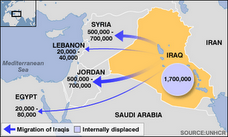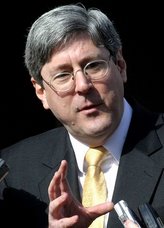 1. January 2003: The Wall Street Journal reported that representatives from Exxon Mobil Corp., ChevronTexaco Corp., ConocoPhillips and Halliburton, among others, were meeting with Vice President Cheney's staff to plan the post- war revival of Iraq's oil industry.
1. January 2003: The Wall Street Journal reported that representatives from Exxon Mobil Corp., ChevronTexaco Corp., ConocoPhillips and Halliburton, among others, were meeting with Vice President Cheney's staff to plan the post- war revival of Iraq's oil industry.2. March 2003: Iraqi Oil Ministry was one of the few structures the invading forces protected from looters in the first days of the war.
3. April 2003: During the initial assault on Baghdad, soldiers set up forward bases named Camp Shell and Camp Exxon.
4. May 22, 2003: President Bush signed Executive Order 13303 providing full legal immunity to all U.S. oil companies doing business in Iraq in order to facilitate the country's "orderly reconstruction."
5. November 2003: McKee (ConocoPhillips executive who is overseeing Iraqi oil industry) quietly ordered a new plan for Iraq's oil. The drafting would be overseen by a "senior adviser," Amy Jaffe, who ....now works for James Baker, the former Secretary of State, whose law firm serves as counsel to both ExxonMobil and the defense minister of Saudi Arabia. The plan, written by State Department contractor BearingPoint, was guided, says Jaffe, by a handful of oil-industry consultants and executives.
6. March 2004: Iraq's interim constitution, the Transitional Administrative Law (TAL) passed in March 2004 by Iraq's Governing Council, sets forth that Coalition Provisional Authority laws, regulations, and orders are to remain in force after the transfer of sovereignty unless a duly enacted piece of legislation rescinds or amends them.
7. August 30, 2005: Bush says U.S. troops would continue fighting in Iraq in order to protect the country's vast oil fields, which he said would otherwise fall under the control of terrorist extremists.
8. February 2006-June 2006: USAID contracts with Bearing Point to draft Iraq’s oil law to provide "legal and regulatory advice in drafting the framework of petroleum and other energy-related legislation, including foreign investment".
9. March 15, 2006: Gen. John Abizaid, the Army general overseeing U.S. military operations in Iraq said the United States may want to keep a long-term military presence in Iraq to bolster moderates against extremists in the region and protect the flow of oil.
10. July 2006: U.S. Government and oil companies get a copy of the draft oil law. In September 2006 the Internation Monetary Fund and World Bank receive their copy.
11. February 2007: "Draft Hydrocarbon Law" was submitted first to the Iraqi Cabinet and then to the Iraqi Parliament (Council of Representatives) by the Cabinet.
12. April -May 2007: Defense Secretary Robert Gates and U.S. Vice President Cheney each travel separately to Baghdad to push political benchmarks and specifically the oil law.
From a Study of U.S. Influence on Iraqi Oil, by Erik Leaver, Carol and Ed Newman, Fellow Institute for Policy Studies June 4, 2007. Click above title to read full article and complete bibliography of sources.





No comments:
Post a Comment